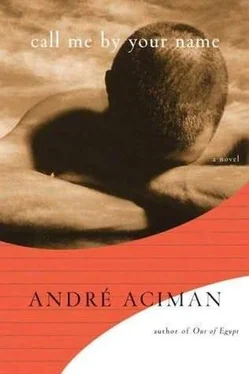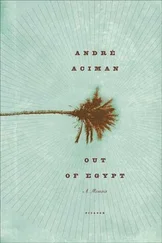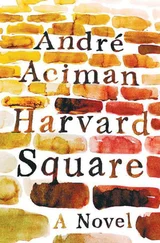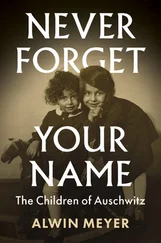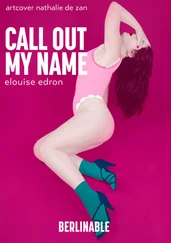André Aciman - Call Me by Your Name
Здесь есть возможность читать онлайн «André Aciman - Call Me by Your Name» весь текст электронной книги совершенно бесплатно (целиком полную версию без сокращений). В некоторых случаях можно слушать аудио, скачать через торрент в формате fb2 и присутствует краткое содержание. Год выпуска: 2007, Издательство: Farrar, Straus and Giroux, Жанр: Современная проза, на английском языке. Описание произведения, (предисловие) а так же отзывы посетителей доступны на портале библиотеки ЛибКат.
- Название:Call Me by Your Name
- Автор:
- Издательство:Farrar, Straus and Giroux
- Жанр:
- Год:2007
- ISBN:нет данных
- Рейтинг книги:5 / 5. Голосов: 6
-
Избранное:Добавить в избранное
- Отзывы:
-
Ваша оценка:
- 100
- 1
- 2
- 3
- 4
- 5
Call Me by Your Name: краткое содержание, описание и аннотация
Предлагаем к чтению аннотацию, описание, краткое содержание или предисловие (зависит от того, что написал сам автор книги «Call Me by Your Name»). Если вы не нашли необходимую информацию о книге — напишите в комментариях, мы постараемся отыскать её.
is clear-eyed, bare-knuckled, and ultimately unforgettable.
Call Me by Your Name — читать онлайн бесплатно полную книгу (весь текст) целиком
Ниже представлен текст книги, разбитый по страницам. Система сохранения места последней прочитанной страницы, позволяет с удобством читать онлайн бесплатно книгу «Call Me by Your Name», без необходимости каждый раз заново искать на чём Вы остановились. Поставьте закладку, и сможете в любой момент перейти на страницу, на которой закончили чтение.
Интервал:
Закладка:
And yet, among the many things I wished to show him the next time I crossed paths with him was gratitude. One could show gratitude and still not be considered intrusive and heavy-handed. Or does gratitude, however restrained, always bear that extra dollop of treacle that gives every Mediterranean passion its unavoidably mawkish, histrionic character? Can’t let things well enough alone, can’t play down, must exclaim, proclaim, declaim…
Say nothing and he’ll think you regret having written.
Say anything and it will be out of place.
Do what, then?
Wait.
I knew this from the very start. Just wait. I’d work all morning. Swim. Maybe play tennis in the afternoon. Meet Marzia. Be back by midnight. No, eleven-thirty. Wash? No wash? Ah, to go from one body to the other.
Wasn’t this what he might be doing as well? Going from one to the other.
And then a terrible panic seized me: was midnight going to be a talk, a clearing of the air between us — as in, buck up, lighten up, grow up!
But why wait for midnight, then? Who ever picks midnight to have such a conversation?
Or was midnight going to be midnight ?
What to wear at midnight?
The day went as I feared. Oliver found a way to leave without telling me immediately after breakfast and did not come back until lunch. He sat in his usual place next to me. I tried to make light conversation a few times but realized that this was going to be another one of our let’s-not-speak-to-each-other days when we both tried to make it very clear that we were no longer just pretending to be quiet.
After lunch, I went to take a nap. I heard him follow me upstairs and shut his door.
Later I called Marzia. We met on the tennis court. Luckily, no one was there, so it was quiet and we played for hours under the scorching sun, which both of us loved. Sometimes, we would sit on the old bench in the shade and listen to the crickets. Mafalda brought us refreshments and then warned us that she was too old for this, that the next time we’d have to fetch whatever we wanted ourselves. “But we never asked you for anything,” I protested. “You shouldn’t have drunk, then.” And she shuffled away, having scored her point.
Vimini, who liked to watch people play, did not come that day. She must have been with Oliver at their favorite spot.
I loved August weather. The town was quieter than usual in the late summer weeks. By then, everyone had left for le vacanze , and the occasional tourists were usually gone before seven in the evening. I loved the afternoons best: the scent of rosemary, the heat, the birds, the cicadas, the sway of palm fronds, the silence that fell like a light linen shawl on an appallingly sunny day, all of these highlighted by the walk down to the shore and the walk back upstairs to shower. I liked looking up to our house from the tennis court and seeing the empty balconies bask in the sun, knowing that from any one of them you could spot the limitless sea. This was my balcony, my world. From where I sat now, I could look around me and say, Here is our tennis court, there our garden, our orchard, our shed, our house, and below is our wharf — everyone and everything I care for is here. My family, my instruments, my books, Mafalda, Marzia, Oliver.
That afternoon, as I sat with Marzia with my hand resting on her thighs and knees, it did occur to me that I was, in Oliver’s words, one of the luckiest persons on earth. There was no saying how long all this would last, just as there was no sense in second-guessing how the day might turn out, or the night. Every minute felt as though stretched on tenterhooks. Everything could snap in a flash.
But sitting here I knew I was experiencing the mitigated bliss of those who are too superstitious to claim they may get all they’ve ever dreamed of but are far too grateful not to know it could easily be taken away.
After tennis, and just before heading to the beach, I took her upstairs by way of the balcony into my bedroom. No one passed there in the afternoon. I closed the shutters but left the windows open, so that the subdued afternoon light drew slatted patterns on the bed, on the wall, on Marzia. We made love in utter silence, neither of us closing our eyes.
Part of me hoped we’d bang against the wall, or that she’d be unable to smother a cry, and that all this might alert Oliver to what was happening on the other side of his wall. I imagined him napping and hearing my bedsprings and being upset.
On our way to the cove below I was once again pleased to feel I didn’t care if he found out about us, just as I didn’t care if he never showed up tonight. I didn’t even care for him or his shoulders or the white of his arms. The bottom of his feet, the flat of his palms, the underside of his body — didn’t care. I would much rather spend the night with her than wait up for him and hear him declaim bland pieties at the stroke of midnight. What had I been thinking this morning when I’d slipped him my note?
And yet another part of me knew that if he showed up tonight and I disliked the start of whatever was in store for me, I’d still go through with it, go with it all the way, because better to find out once and for all than to spend the rest of the summer, or my life perhaps, arguing with my body.
I’d make a decision in cold blood. And if he asked, I’d tell him. I’m not sure I want to go ahead with this, but I need to know, and better with you than anyone else. I want to know your body, I want to know how you feel, I want to know you, and through you, me.
Marzia left just before dinnertime. She had promised to go to the movies. There’d be friends, she said. Why didn’t I come? I made a face when I heard their names. I’d stay home and practice, I said. I thought you practiced every morning. This morning I started late, remember? She intercepted my meaning and smiled.
Three hours to go.
There’d been a mournful silence between us all afternoon. If I hadn’t had his word that we were going to talk later, I don’t know how I’d have survived another day like this.
At dinner, our guests were a semi-employed adjunct professor of music and a gay couple from Chicago who insisted on speaking terrible Italian. The two men sat next to each other, facing my mother and me. One of them decided to recite some verses by Pascoli, to which Mafalda, catching my look, made her usual smorfia meant to elicit a giggle from me. My father had warned me not to misbehave in the presence of the scholars from Chicago. I said I would wear the purple shirt given me by a distant cousin from Uruguay. My father laughed it off, saying I was too old not to accept people as they were. But there was a glint in his eyes when both showed up wearing purple shirts. They had both stepped out from either side of the cab at the same time and each carried a bunch of white flowers in his hand. They looked, as my father must have realized, like a flowery, gussied-up version of Tintin’s Thomson and Thompson twins.
I wondered what their life together was like.
It seemed strange to be counting the minutes during supper, shadowed by the thought that tonight I had more in common with Tintin’s twins than with my parents or anyone else in my world.
I looked at them, wondering who was top and who was bottom, Tweedle-Dee or Tweedle-Dum.
It was almost eleven when I said I was going to sleep and said goodnight to my parents and the guests. “What about Marzia?” asked my father, that unmistakable lambent look in his eyes. Tomorrow, I replied.
I wanted to be alone. Shower. A book. A diary entry, perhaps. Stay focused on midnight yet keep my mind off every aspect of it.
On my way up the staircase, I tried to imagine myself coming down this very same staircase tomorrow morning. By then I might be someone else. Did I even like this someone else whom I didn’t yet know and who might not want to say good morning then or have anything to do with me for having brought him to this pass? Or would I remain the exact same person walking up this staircase, with nothing about me changed, and not one of my doubts resolved?
Читать дальшеИнтервал:
Закладка:
Похожие книги на «Call Me by Your Name»
Представляем Вашему вниманию похожие книги на «Call Me by Your Name» списком для выбора. Мы отобрали схожую по названию и смыслу литературу в надежде предоставить читателям больше вариантов отыскать новые, интересные, ещё непрочитанные произведения.
Обсуждение, отзывы о книге «Call Me by Your Name» и просто собственные мнения читателей. Оставьте ваши комментарии, напишите, что Вы думаете о произведении, его смысле или главных героях. Укажите что конкретно понравилось, а что нет, и почему Вы так считаете.
